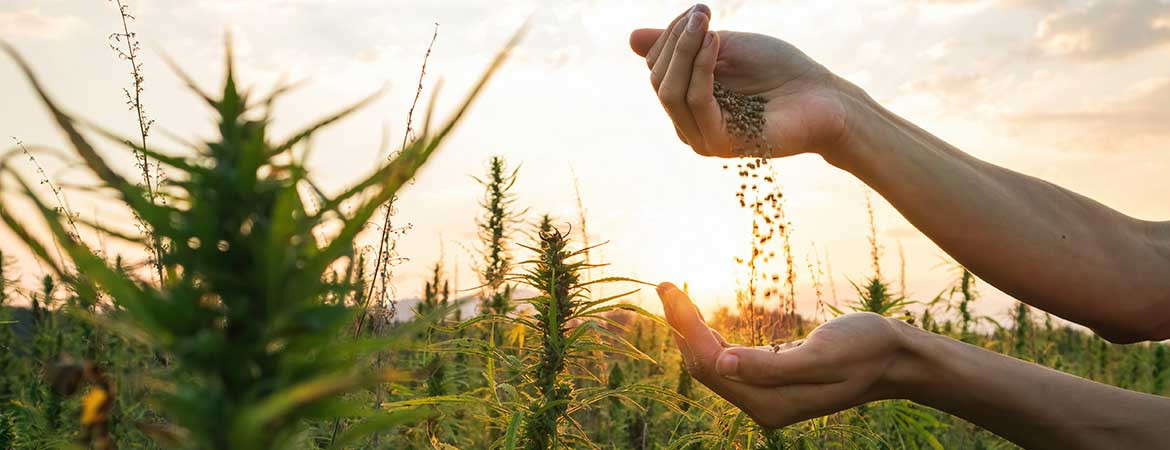- Free Shipping Over $75
- 60-Day Money-Back Guarantee
Shop Popular Products
Made from US-Grown Industrial Hemp
100% Clean Ingredients
Rigorously Tested, Quality Assured

After months of anticipation, news broke today that the 2018 Farm Bill has officially been signed by the House and Senate. The final step is for President Trump to sign off on the bill, changing the hemp-derived CBD industry overnight.
So what is the significance of this bill and what does it mean for consumers, businesses, and farmers? Here is a look at how the 2018 Farm Bill will change the industry for the better.
Hemp cultivation has not always been a source of controversy. This hearty plant was once an agricultural staple. Hemp seeds and strong, durable hemp fibers were relied upon for numerous products. Early American settlers used hemp to make building materials, cloth, paper, rope, and canvas. During Colonial times, farmers were required to grow hemp, and several colonies used hemp as legal tender.
Until the enactment of the 1937 Marijuana Tax Act, cannabis plants were legal. It was during the government’s efforts to discourage marijuana use that hemp first became entangled in the crossfire. Some historians believe campaigns to generate public support for curtailing marijuana use intentionally blurred the lines between hemp and marijuana. Some believe hemp was deliberately “demonized” to eliminate hemp as a competing fuel source. While hemp and marijuana were understood to be entirely different plants, hemp farmers were subjected to heavy taxation that made hemp farming unsustainable.
It was the Controlled Substance Act of 1970 that (temporarily) sealed hemp’s fate. When the government classified cannabis as a schedule 1 drug, a substance with no accepted medical use, the order was written to cover cannabis, not marijuana specifically. Once the government included cannabis as a whole, it was no longer legal to grow hemp in the US without the consent of the US Drug Enforcement Agency.
For a long time, there was no legal differentiation between hemp and marijuana. To our government, cannabis was cannabis, whether psychoactive or not. The 2014 Farm Bill was a significant development for the hemp industry.Until the passing of this monumental legislation, hemp cultivation was banned in the United States, forcing manufacturers to rely on imports from Canada, Europe, and China. This bill provided the legal differentiation between hemp and marijuana based on their THC content. THC is the compound in cannabis responsible for marijuana’s psychoactive effects. The Agricultural Act of 2014 set the following parameters:
While the 2014 Farm Bill left hemp farming decisions to state discretion, it did not remove hemp from the list of substances regulated by the federal government. The 2018 Farm Bill does. With federal restrictions lifted, hemp will be treated in the same manner as any other commodity. Just a few of the anticipated benefits of removing hemp from the list of controlled substances include:
As it stands, some people still question the legality of hemp and hemp-derived products because of hemp’s federal classification as a controlled substance. Provisions clearly separate the definition of hemp versus marijuana removing any potential grey areas. When the shades of grey resolve to black and white, there will be no more reason to debate, or explain, the legality of hemp in the US1.
Many CBD companies suddenly find themselves without access to a bank account or payment processor. This can happen when the bank determines that hemp products are legally questionable. With the legal clarity provided by the 2018 Farm Bill, product vendors will have better access to third-party processing, banking services, and investment opportunities.
There is still a stigma associated with hemp use. With the passing of the 2018 Farm Bill clearly recognizing the legality of hemp products, we believe much of the uneasiness some people experience when considering the use of hemp CBD will be resolved.
Although hemp crop legality varies by state, hemp farmers are not eligible for federal crop insurance. That’s because hemp is still not considered an agricultural crop. Once hemp is reclassified as an agricultural commodity, hemp farmers will be able to protect their investment from lost revenue caused by declining prices or natural disasters.
CBD is one of the many potentially beneficial cannabinoids found in cannabis extract. Hemp CBD provides all the potential health and wellness benefits as marijuana without the risk of intoxication. Prior to the Farm Bill, it was difficult for researchers to obtain funding for hemp oil research. By removing federal restrictions, researchers gain access to federally-funded research programs to further investigate the potential medicinal benefits of hemp oil.
We believe that the signing of the 2018 Farm Bill will provide substantial economic benefits. As domestic hemp production increases, industries will no longer have to rely on imported hemp. Economic stimulation will continue as we welcome more hemp farmers, product manufacturers, business investors, and product consumers to our thriving community. Hemp products are anticipated to evolve into a 22 billion dollar industry by 2022.
CBDistillery has a mission to educate the public about the differences between hemp and marijuana, and the many potential benefits of CBD oil. With the 2018 Farm Bill passing, our mission has never been more important and ask our followers to help up educate others. To learn more about what CBD could do for your health and well-being, download the Ultimate CBD User Guide. Our CBD user guide explains how CBD interacts with your body and why CBD has so many potential health and wellness benefits.